Trading Day: ASX steadies after Covid hit, AGL cuts profit forecast
Stocks steadied at the close amid the fallout from Sydney’s Covid outbreak; AGL slashed its profit outlook and the US reached a virus relief deal.
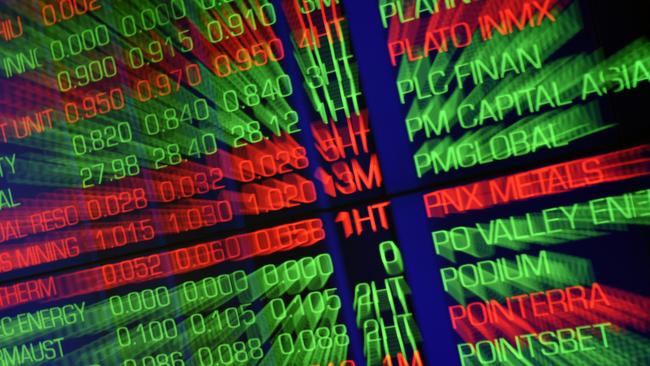
- AGL slashes profit forecast
- Shell in $3.3bn LNG sale
- Medibank to lift premiums 3.25pc
- Pandemics ‘an uninsurable risk’
That’s all from the Trading Day blog for Monday, December 21. Australian stocks steadied at the close of trade, following the return of border restrictions because of Sydney’s COVID-19 outbreak. The US said a deal had been reached on a coronavirus relief package.
James Kirby 7.21pm: What’s ahead for investors in 2021?
Undeterred by upsets in 2020, sharemarket forecasters are back with “market outlooks” suggesting 2021 will be exceptionally good for investors with new records being set as the world enjoys the best economic growth for 50 years.
Many top analysts are suggesting we are on course to see total returns of 10 per cent or more in the ASX in the year ahead.
Better still, forecasts suggest that Australian shares will be among the very best investment choices worldwide in 2021 with the S&P/ASX 200 due to hit new record highs.
Veteran analyst David Cassidy, head of investment strategy at Wilsons, joined the party this week adding his considerable reputation to a growing consensus investors could be in for a bumper year with risks, as they like to put, firmly on the “upside”.
As 2020 comes to a close after a very strong performance in November and December it looks like we will finish this year with a flat to mildly improved performance over the last 12 months with the ASX 200 around 6600.
However, if most forecasters get it right next year we should be well north of 7000 on the ASX 200 — CommSec forecasts a figure of 7225 by December 2021.
Shane Oliver at AMP Capital forecasts 12 per cent total returns for Australian shares next year — (total returns include dividends which are expected to be more than 4 per cent again in 2021).
If local shares make this number they will equal virtually any other asset class available including Asian shares and emerging markets equities.
Behind the bullish — some might say heroic — assumptions shared by leading analysts is the core belief that company earnings will jump in 2021 powered by rebounding economic growth.
Eli Greenblat 6.05pm: City Chic Collective expands into UK
Plus-sized women’s fashion chain City Chic Collective is cementing its position as a leading brand owner in the $50bn global “curves” fashion industry with the purchase out of administration of British retailer Evans to match its existing strong presence in Australia and the US.
City Chic, which in September lost out in a bidding war for the US e-commerce assets of fashion brand Catherines, has acquired the leading clothing brand Evans from Phillip Green’s collapsed Arcadia Group in Britain for £23.1m ($41m), giving it a foothold in Europe to match its recent expansion in the US and growing brand power in Australia.
Arcadia also owned well-known brands such as Topshop and failed last month putting more than 13,000 jobs at risk in Britain.
The UK plus-sized women’s fashion chain has a history of 90 years as a high street retailer in Britain with City Chic picking up Evans e-commerce and wholesale businesses (excluding store portfolio), which generated £26m of sales.
City Chic said Evans had a loyal customer following, with 19 million annual website visits. It said it would give it a platform to launch into a new market, with an estimated worth of £5bn-plus annually.
Shares in City Chic rallied more than 13 per cent on the deal and later closed up 11 per cent at $3.52.
4.38pm: ASX little changed after dip
Australia’s sharemarket was little changed after an intraday dip caused by state border closures and social distancing orders following the COVID-19 outbreak in Sydney.
The S&P/ASX 200 index fell as much as 0.6 per cent to a three-day low of 6635.8 points before bouncing to close down less than 0.1 per cent at 6669.9 point.
Travel stocks were initially pummelled before bouncing as the share market stabilized after the number of officially confirmed new locally-acquired cases in NSW cases fell.
Qantas closed down 0.6 per cent at $4.89 after diving 6.3pc to a six-week low of $4.61.
Flight Centre ended down 1.8pc and Webjet lost 0.4pc. Both dipped about 7 per cent.
Sydney Airport fell 0.8pc, Tabcorp lost 1.5 per cent, Crown Resorts fell 1.7 per cent, SkyCity Entertainment dived 4.4 per cent and The Star Entertainment tumbled 2.4 per cent.
Star Entertainment said the NSW Government’s announcement in relation to COVID-19 restrictions that apply to Greater Sydney in light of the growing COVID-19 cluster centred on the northern beaches will “impact” the Star Sydney property.
Bank shares were choppy but overall little changed.
The energy sector fell with Woodside down 2.5pc as crude oil slipped about 3pc.
AGL Energy dived 5.1pc after slashing its earnings guidance by 11pc due to the transformer outage at the Liddell Power Station.
But miners were well supported with Fortescue up 4.9pc after the iron ore price rose 3.2pc to $US162.10 a tonne and Dalian iron ore futures gained by as much as 8pc.
Wall Street may be volatile amid index rebalancing including Tesla’s addition to the S&P 500, as well as a congressional vote on pandemic relief assistance.
Eli Greenblat 3.49pm: Demand up for groceries, but no panic: Woolies
The outbreak of COVID-19 in some beachside communities north of Sydney has triggered some increased demand in key groceries at the supermarkets but has not generated the kind of panic buying witnessed in March when the pandemic saw customers stripping products from the supermarket shelf.
A spokesman for Woolworths said on Monday: “There’s been an uptick in demand in some of our stores, but not anywhere near the levels seen earlier this year.
“We’ll continue to keep a close eye on demand and our stock levels.
We ask customers to buy only what they need, as we have plenty of stock to replenish our shelves.”
Shares in Woolworths on Monday were down 11c at $39.88 and Coles were up 28c to $18.58.
Elise Shaw 3.34pm: Petrol prices ease ahead of Christmas: CommSec
Unleaded petrol prices are easing in Sydney and Melbourne ahead of Christmas Day, notes CommSec senior economist Ryan Felsman.
“Today, pump prices are averaging 132.2 cents a litre in Sydney and 133.6 cents a litre in Melbourne, according to real-time fuel app MotorMouth. Motorists should top up their tanks rather than fill up with prices likely to be lower next week.”
Sydney pump prices peaked at 140.2 cents a litre last Tuesday and will likely ease to around 126 cents a litre by Christmas Day – below the decade average of 135.7 cents a litre.
Frustratingly for Melbourne motorists unleaded petrol prices continue to fall at a snail’s pace. Today, prices are averaging 133.6 cents a litre, down almost 12 cents a litre from cycle peaks of 145.5 cents a litre on December 9. Prices could be around 129 cents a litre on Christmas Day – below the decade average of 135.1 cents a litre, says Felsman.
“Brisbane unleaded fuel prices are averaging 147.9 cents a litre today. Prices are near the peak of the most expensive phase of the retail cycle, surging almost 37 cents a litre since December 9. Motorists should shop around to find the cheapest prices before Christmas with fuel prices expected to ease from Boxing Day.”
Datium Insights reported that wholesale used car prices rose by 1.8 per cent in the past week to be up more than 30 per cent since the beginning of the year.
“There may be more cars on the road, but Aussies have travelled less during the pandemic,” Felsman notes.
“And bushfire, drought and floods have disrupted road trips over recent years. The total number of Aussie motor vehicles rose from 19,012,770 in June 2018 to 19,768,518 in June 2020. But over the same period, the average distance travelled by passenger vehicles fell from 12,600 kilometres to 11,100 kilometres – likely due to Covid-19 restrictions.”
Jared Lynch 3.05pm: CUB shuts Sydney pub for deep clean
Carlton United Breweries has closed one of its three pubs on Sydney’s northern beaches after NSW Health linked it to the peninsula’s growing cluster of coronavirus infections.
CUB, which Japanese beverage giant Asahi bought for $16bn earlier this year, has confirmed it has closed its 4 Pines Public House at Newport.
“Our Newport Public House venue has undergone a deep clean and is presently closed. We’ve been working closely with NSW Health to ensure we’re fully compliant with their regulations,” a CUB spokesman said.
On Monday, NSW Health ordered people who had visited five venues - including the 4 Pines pub at Newport - in the past week to get a COVID-19 test and regardless of the outcome self-isolate for 14 days.
It comes as the state’s chief health officer Dr Kerry Chant confirmed on Monday morning the outbreak rose overnight by 15, taking the total number of people linked to the cluster to 83.
NSW Health said anyone who visited the following venues during the dates and times listed is considered a close contact and should get tested immediately. The venues include:
Anytime Fitness, 7 Taronga Place, Mona Vale on Thursday December 17, between 9:50am and 12:45pm;
G Fitness, 72/80 Evans St, Freshwater on Tuesday December 15, between 11am and 12:45pm;
4 Pines, 313 Barrenjoey Rd, Newport on Wednesday December 16, between 4:30pm and 9pm;
Twenty-One Espresso, 21 Knox St, Double Bay – Any staff who worked on Tuesday December 15, and any patrons seated in the indoor section on that day for more than an hour between 7:10pm and 8:15pm, or between 8:25pm and 9:10pm;
Garfish Manly, 1/39 E Esplanade, Manly on Thursday December 17, between 6:45pm and 10pm (this was on a previous list but the time period has been revised).
Lilly Vitorovich 2.34pm: Low Test audience may boost Seven’s cricket case
Seven Network strongly believes its case to secure a better broadcast deal with Cricket Australia has been bolstered after the first cricket Test between Australia and India recorded a double digit drop in television viewers.
The free-to-air television network, which is owned by Seven West Media, is understood to believe the poor Test audience figures backs up its view that it should not have been held so close to Christmas, and it should be given a discount for the schedule changes.
Seven’s national average audience for the first cricket Test of the summer, which ended on Saturday with Australia thrashing India, was 682,000. That’s down 14 per cent from a national audience of 794,000 that watched the first three days of the second Test between Australia and India in December 2018.
Perry Williams 1.42pm: AGL slashes profit forecast
AGL Energy has taken a giant hit to its 2021 profit outlook after suffering a major outage at its Liddell coal plant in NSW on Thursday, and tough market conditions for the electricity industry.
The power giant now expects underlying profit after tax for FY21 to be between $500m and
$580m, down from the previous guidance range of $560m to $660m.
That’s an 11pc downgrade at the midpoints.
The financial impact of the Liddell outage is $25m after tax, which includes the trading hit taken on the day and the cost of replacing the transformer.
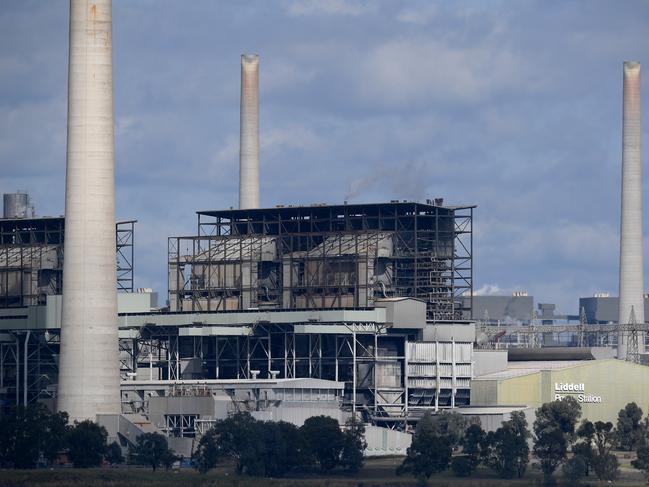
AGL is also suffering from “increasing earnings pressure arising from recent trading performance and a continued deterioration in market and operating conditions in wholesale electricity.”
AGL further warned of a deteriorating outlook for the 2022 financial year with a “material step down” in wholesale electricity earnings.
“AGL anticipates a further material step-down in wholesale electricity earnings in FY22 as hedging positions established when wholesale prices were materially higher progressively roll off, and are re-contracted at lower levels reflecting the deterioration in wholesale prices,” AGL said in a statement to the ASX.
It will also lose insurance benefits from the Liddell and Loy Yang A power plants, hitting the bottom line in 2022.
“The financial impact of the Liddell Unit 3 outage is not recoverable via insurance in future years. AGL also notes that it has previously stated that there will be no recurrence in FY22 of the FY21 contribution to Underlying Profit after tax of $80m to $100m expected from insurance proceeds related to a prior outage at Unit 2 of the Loy Yang A power station in Victoria.”
AGL also gave details of how a fire at its Liddell plant caused the accident which left a worker seriously injured and has put the power grid on edge for the summer given reduced supplies.
“A fire occurred in the generator transformer of Liddell Unit 3 during a change of an oil cooler filter, causing the transformer to be damaged and the unit to be shut down. Replacement of the affected transformer is expected to be completed using a spare transformer
within AGL’s inventory.”
AGL expects the Liddell unit will not return until after summer, in early March.
AGL shares dropped from $13.10 to $12.84 on this update and were last down 1.4pc at $13.04.
12.40pm: Sydney’s Star casino cuts numbers again
Casino operator The Star said it will reintroduce customer restrictions at its Sydney casino as a result of the growing COVID-19 cluster in the city’s northern beaches.
As part of this. a 300-patron cap per area will be reinstated.
“These restrictions will impact The Star Sydney property. From Monday … the Star Sydney property will revert to operating with one person per four square metres - previously the casino was operating under one person per two square metres,” Star said.
“There will be seven zones across the casino area, including three zones on the main gaming floor,” Star said.
At 12.30PM shares in Star Entertainment were down down 3 per cent at $3.63.
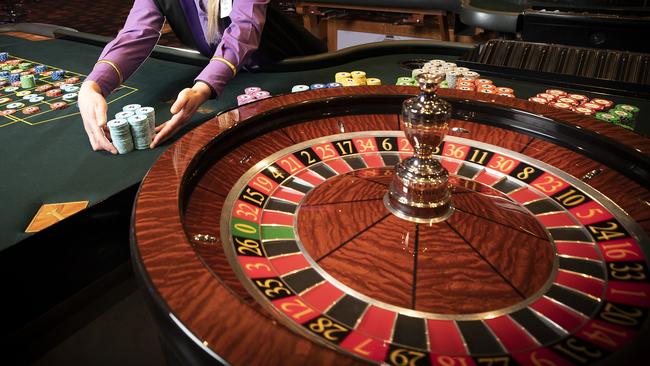
Eli Greenblat 12.20pm: Covid claims land Lorna Jane in court
Activewear maker Lorna Jane is facing new action over antivirus claims it made for some of its products, with the Australian Competition and Consumer Commission starting in the Federal Court proceedings against the company, alleging it made false and misleading claims about the clothing’s ability to ward off pathogens.
The ACCC has also named Lorna Jane director and chief creative officer Lorna Jane Clarkson as being knowingly involved in the misleading behaviour, alleging she personally made false or misleading claims about the “LJ Shield” antivirus activewear in a media release and a video posted on Lorna Jane’s Instagram account.
It’s the second action taken against the company over the claims, with the Therapeutic Goods Administration issuing nearly $40,000 worth of infringement notices in July.
Lorna Jane had claimed that its “antivirus Activewear”, which was sprayed with a substance called ‘LJ Shield’, eliminated and stopped the spread of COVID-19 and provided protection against viruses and pathogens, including COVID-19, when this was not the case.
12.03pm: ASX down 0.5pc at noon
Australia’s S&P/ASX 200 share market fell 0.5pc to a three-day low of 6643.2 points in choppy trading, as NSW reported 15 new locally-acquired COVID-19 cases in Sydney.
Travel-related stocks were initially among the worst affected, with Qantas falling as much as 6.4pc, but those stocks bounced strongly through the morning.
After an early tumble, the index bounced into positive territory late morning but turned back down after a pandemic update from NSW Premier Gladys Berejiklian.
The index subsequently hit a new intraday low, but the renewed selloff was mainly caused by volatility in banks and resources.
The Energy sector was weakest with Woodside down 2.5pc as WTI crude turned down 1.5pc, while the Real Estate sector, Industrials, Tech and Financials sectors also underperformed.
WiseTech was the weakest stock in the ASX200, down 9.2pc on volume 2.7pc times average.
Kogan was strongest with a 5.3pc rise while A2 Milk rose 2.5pc amid broker upgrades.
Bridget Carter 12.01pm: Analysts back Boral brick sale
Analysts at Morgan Stanley believe that Boral achieved a “favourable” price for the sale of its North American-based Meridian Brick business to Wienerberger for $US250 million.
The response from analysts flies in the face of some industry experts who believe that the country’s largest building materials supplier could have achieved a slightly higher price for the division from an industry player if it had run a competitive auction.
Meridian wanted $600m about two years ago when it fielded approaches for the division from industry groups, say sources.
The sale of the Meridian plants in the southern US represents a full exit from bricks for Boral globally.
Since 2016, Boral has owned half of the joint venture with private equity firm Lone Star Funds – a fund that is said to have earlier been running the ruler over Boral – and the transaction will see Boral receive $US125m in proceeds, which is slightly above its book value.
Boral is expected to book a $10m profit on the sale when it completes in the new year.
In a research note, Morgan Stanley analysts said the transaction was a further step towards a simplification of the business and a strengthening of the balance sheet under new chief executive Zlatko Todorcevski.
“With the agreed sale of the plasterboard joint venture, this represents two divestments that have achieved agreed sale prices ahead of our valuation,” Morgan Stanley analysts said in their research.
“This bodes well for further potential transactions.”
Boral has indicated that it will test the market for its US building products assets next year, and DataRoom understands that the company is close to offering a formal mandate to an investment bank to handle the transaction.
11.49am: US Covid relief deal heads for vote
US lawmakers have reached a deal for a new package to boost the world’s largest economy, which has been battered by the coronavirus pandemic, congressional leaders announced.
“We’ve agreed to a package of nearly $US900 billion. It is packed with targeted policies to help struggling Americans who have already waited too long,” Republican Senate leader Mitch McConnell in a statement.
Democratic House Speaker Nancy Pelosi and Senate minority leader Chuck Schumer confirmed an agreement had been reached with Republicans and the White House on a deal that “delivers urgently needed funds to save the lives and livelihoods of the American people as the virus accelerates.”
The package is expected to include aid for vaccine distribution and logistics, extra jobless benefits of $US300 per week, and a new round of $US600 stimulus checks -- half the amount provided in checks distributed last March under the CARES Act.
Congress was working under a deadline of midnight Sunday (US time) -- needing to reach consensus both on assistance to hard-pressed American households and companies and on the 2021 federal budget in order to avoid a government shutdown.
Number two Democrat in the House of Representatives, Steny Hoyer, said he expected the deal to pass tonight (AEDT) and then head to the Senate.
This would require passage of a stopgap measure by midnight on Sunday (4pm (AEDT) to keep the federal government funded an extra 24 hours and avert a shutdown.
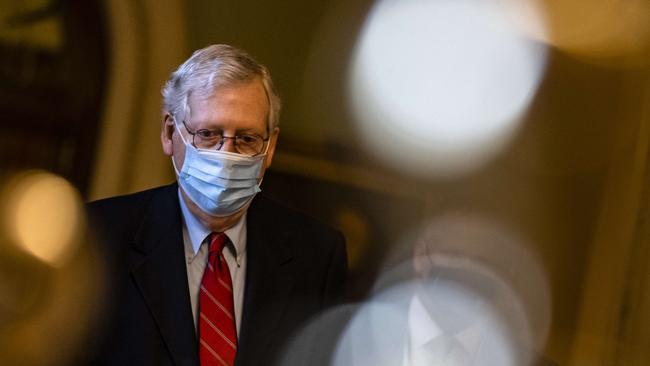
AFP
Perry Williams 11.40am: Shell in $3.3bn LNG sale
Energy giant Shell has sold its Queensland LNG infrastructure to investment fund GIP for $US2.5bn ($3.3bn).
The deal will see Shell offload a 26.25 per cent stake in the QCLNG infrastructure facilities to GIP, leaving it with a 73.75 per cent share overall.
GIP was widely seen in a two-horse race with Queenland’s IFM Investors for the Shell assets.
Assets included in the deal are LNG storage tanks, jetties and operations infrastructure that services QCLNG’s two gas export trains at Gladstone.
“This decision is consistent with Shell’s strategy of selling non-core assets in order to further high-grade and simplify Shell’s portfolio,” Shell said in a statement. “The sale will contribute to Shell’s expected divestment proceeds, without impact on people or the operations of the QCLNG venture, and aligns Shell’s interest in the common facilities with its 73.75 per cent interest in the overall QCLNG venture.”
Shell, which supplies 16 per cent of Australia’s east coast gas demand, owns 73.75 per cent of QCLNG with China’s CNOOC holding a 25 per cent stake and Tokyo Gas the remaining 1.25 per cent.
The QCLNG facility produces 8.5m tonnes of LNG a year for export markets.
GIP was among partners that acquired a 50 year lease of the Port of Melbourne in 2016.
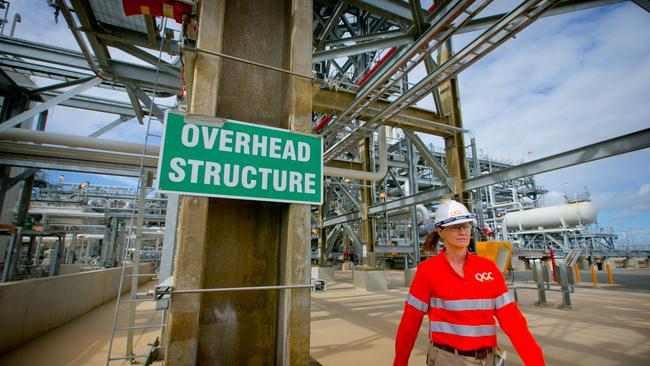
11.36am: 12 reasons why banks look good
In the spirit of Christmas, Bell Potter’s TS Lim has come up with 12 qualities that support his view that the Australian banking sector looks attractive after a challenging year.
* Sector book value per share of 1 times “screams value”;
* Underlying cost growth of 2pc shows “cost discipline”;
* The consensus is for 3pc economic growth - a leading indicator of credit growth;
* Home loan repayment deferrals are just 4pc and falling;
* Banks are trading on a 5pc dividend yield or 7pc grossed up, which is well above-term deposits and cash rates;
* Their leverage ratio of 6pc is “stronger than ever”;
* Their commercial property exposure at default of 7pc is the “lowest in years”;
* Their deposits remain a “handy funding source” with growth of 8pc;
* Their income growth for smaller regional banks is “unbeatable”;
* Their underlying return on equity is “on the mend”;
* Their CET1 regulatory capital ratio is “ahead of APRA minimum”;
* Their 12cp pro-forma CET1 “adds to capital management flexibility”.
One could add to that list of positives the fact that APRA has cleared banks to boost their dividends and buybacks.
One negative is the coronavirus outbreak in NSW and the associated lockdowns and state border closures.
But if policymakers judge that it will significantly hurt the economic outlook, it might possibly lead the government to extend JobKeeper in March and might pressure the RBA to do another round of quantitative easing in the second half.
11.27am: ASX rise short-lived
Australia’s S&P/ASX 200 back in a red after a short-lived bounce, as travel stocks are hit by travel bans linked to Sydney’s coornavirus outbreak.
The index was recently down 0.4 per cent at 6648.
Jess Malcolm 11.12am: Only 15 new Sydney Covid cases
NSW Premier Gladys Berejikian says there were 15 locally-acquired COVID-19 cases in Sydney, all of which were directly linked to Sydney’s Northern Beaches cluster, following record testing numbers.
Amid fears of a Sydney-wide outbreak, there were only half of yesterday’s reported cases despite over 38,000 tests conducted in the past 24 hours.
“I’m pleased to say overnight, we had 15 locally acquired cases - all of which are linked to the Avalon cluster,” Ms Ms Berejiklian said. “And obviously, our continued hard effort is required to make sure that we continue that downward trend.”
While the source of the initial infection still remains unclear to health officials, Ms Berejiklian said she is encouraged by the downward trend from yesterday’s numbers.
“But as we know in a pandemic, things can be volatile and can move quickly. But pleasingly overnight, we did see a reduction in the previous day’s numbers.”
Lilly Vitorovich 11.07am: First Test a ratings winner
The first cricket Test of the summer, in which Australia thrashed India, has proved a ratings hit for Seven Network, which is looking to strike a better broadcast deal with Cricket Australia.
The broadcaster’s coverage over the three days reached 6.37m people, peaking at 1.48m.
The third and final day of the first Test at the Adelaide Oval on Saturday attracted an average national audience of 701,000 and 498,000 in the five capital cities, according to figures from ratings agency OzTam.
The first session on Saturday boasted 831,000 national viewers and 531,000 capital-city viewers, which then rose as the Aussies headed to victory.
For the second session, Seven’s national and metro audience rose to 893,000 and 587,000, respectively, as Australia won by eight wickets.
Both sessions dominated their timeslots, ranking No 1 in the demographics of people 25 to 54 and 16 to 39, plus total people.
Seven’s legal push to secure a better broadcast deal with Cricket Australia will be heard in the Federal Court in mid-March, and could lead to damages or the termination of its $450m deal.
Seven West Media, which owns the free-to-air TV network, were down 4.9 per cent to 29c in late morning trading on the ASX on Monday.

11.07am: ASX turns up after early fall
Australia’s S&P/ASX 200 has risen 0.1pc to an intraday high of 6678 after falling 0.4pc to a 3-day low of 6645.8.
The bounce was mainly driven by the major banks, with CBA up 0.3pc after falling 1pc.
10.51am: Watch for opportunities in selloff: MS
Morgan Stanley equity strategists tell clients to watch for “oversold opportunities” in “reopening plays” in Australian shares linked to developments with “borders, mobility and social capacity.”
But with an initial vaccine rollout domestically still several months away, they warn that “guards may be lifted rather than lowered to protect COVID normal status ahead of a vaccine enabled-recovery”.
The S&P/ASX 200 share index and the Australian dollar are likely to be “pressured in the short term”, they warn.
“Developments highlight the differentiated response mechanisms between states,” note the strategists, led by Chris Nicol.
“In NSW a continued focus on suppression sees many measures - particularly around masks and social density - still more relaxed than current Victoria measures.”
“In other states where elimination has largely been achieved – it is clear that border strategies and strict isolation will be used to sustain that status.
“This has implications for reopening momentum if NSW achieves a level of containment acceptable to their policy makers yet poses risk to more strident parameters upheld by other states.”
10.36am: NIB to lift premiums by 4.36pc
NIB says its received federal aproval to increase health insurance premiums by an average of 4.36 per cent from 1 April 2021 to meet future claims and medical costs.
NIB says its average premium increase for the past three years is 3.55 per cent.
“Premium changes are never welcomed but the reality is that the cost of medical treatment continues to rise well above inflation and we’re increasingly seeing members access healthcare services with health insurance a critical funding tool enabling treatment and care,” said NIB managing director Mark Fitzgibbon.
10.23am: ASX opens lower amid travel curbs
Australia’s share market fell early on Monday after state governments imposed interstate travel restrictions in response to the worsening coronavirus outbreak in NSW, and as US futures reversed early gains while awaiting a vote on a pandemic relief bill later Monday.
The S&P/ASX 200 index fell 0.4pc to a three-day low of 6645.8 points, exceeding a 0.1pc fall implied by Friday night futures. with travel-related stocks weakest.
Flight Centre fell 7pc, while Qantas and Webjet fell by up to 6pc.
WiseTech was weakest with an 8pc fall on volume 2.6 times its 20-day average.
Energy was the weakest sector with Oil Search down 2.9pc as WTI crude futures fell more than 1pc.
The Industrials, Real Estate, Financials and Communications sectors also underperformed.
NAB was weakest of the major banks with a 1.4pc fall while iron ore miners jumped with Fortescue up 2pc.
The Australian dollar has retreated as low as US75.83c after rising to a 30-month high of US76.40c last Thursday.
The S&P/ASX 200 share index hit a 3-day low of 6645.8 today after rising to a 10-month high of 6756.7 last Thursday.
10.16am: US Congress reaches deal on Covid relief package
US lawmakers have reached a deal for a new package to boost the world’s largest economy, which has been battered by the coronavirus pandemic, Republican Senate leader Mitch McConnell said.
“We’ve agreed to a package of nearly $US900 billion. It is packed with targeted policies to help struggling Americans who have already waited too long,” McConnell said in a statement.
AFP
10.15am: US futures edge up after relief deal
US stock-index futures attempted to edge higher but were seeing relatively muted gains as Congress reached a deal on a $US900 billion coronavirus relief package.
Futures for the Dow Jones Industrial Average rose 0.3pc, those for the S&P 500 were flat while Nasdaq-100 futures rose 0.2pc.
The agreement was seen as vital to helping troubled American workers and businesses as the COVID-19 pandemic rages in much of the country. The deal, which would see qualifying Americans receive direct payments of $US600, come after the stock market closed mixed on Friday.
Dow Jones
Perry Williams 9.54am: Origin buys into Canning Basin gas
Origin Energy has bought into Buru Energy’s Canning Basin gas permits in Western Australia with an option to operate the venture and any future carbon capture and storage development.
The gas and power giant will pay $35m over two years, including a two-well drilling program and seismic work, after buying a 50 per cent equity share in five permits with Buru.
It will also gain a 40 per cent stake in two permits in the west Kimberley region with Buru and Rey Resources in exchange for carrying $12.3m of their share of work program costs.
“Our interest in these seven permits lies in the strength of the gas resources following extensive analysis of the basin, and the longer-term potential for carbon capture and storage,” Origin’s executive general manager for integrated gas Mark Schubert said.
“Our Canning Basin acreage position will also give us exposure to value uplift from the activity of other explorers adjacent to our permit areas, with the option to supply gas for LNG backfill and to customers in domestic and regional markets.”
9.48am: More trouble ahead for A2: Citi
Shareholders in A2 Milk are bracing for a further hit after investment analyst Citi warned the group is “not out of the woods” and downgraded its own expectations.
In a note to clients, Citi analyst Sam Teeger said there were key issues facing the business, including a growing impact from the resurgence of domestic brands, a prolonged slump of the daigou sales channel, potential price pressures as resellers move to clear inventory and current geopolitical tensions.
“While a2 indicated the resurgence of domestic brands has been helped by the recent daigou channel disruptions, our 2019 research indicates the resurgence started to occur in 2016, when the daigou channel was thriving.”
There was an increased risk of a further downgrade to FY21 earnings as a result of the resurgence of domestic brands, A2’s lack of innovation and the move of diagous away from the brand due to lower return prospects.
“The (daigou) channel outlook remains uncertain given regulatory risks and it is unknown when Chinese students and tourists will return to Australia and if they do, they may trade competitor products offering better margins,” Mr Teeger said.
Citi estimated earnings per share from FY21-FY23 would be down by 15-24 per cent driven by the profit downgrade.
“New target price is $9.50 (-33 per cent) due to earnings changes and the removal of the premium in our PE Rel valuation given the outlook has fundamentally changed, in our view, from the resurgence in domestic brands.”
9.42am: Medibank to lift health premiums 3.25pc
Listed health insurer Medibank says health insurance premiums across its brands will rise by an average of 3.25 per cent from April 1, 2021.
Federal Health Minister Greg Hunt is set to outline private health insurance premium rises today.
For its part Medibank, the nation’s largest health insurer, says this is the lowest premium rise in 20 years.
“Medibank is committed to ensuring that private health insurance remains affordable for Australians. Which is why in 2021 we are delivering our lowest premium increase in 20 years,” Medibank chief customer officer David Koczkar.
“While we have supported our customers through COVID-19 – with a customer support package of more than $185 million – we knew we needed to keep the 2021 premium increase as low as possible”.
He says COVID-19 is “the biggest health crisis we’ve faced in a generation”.
“Private health insurance will continue to play an important role in taking pressure off the public hospital system as it gets through a backlog of elective surgeries,” Koczkar said.
Medibank shares last traded at $2.93.
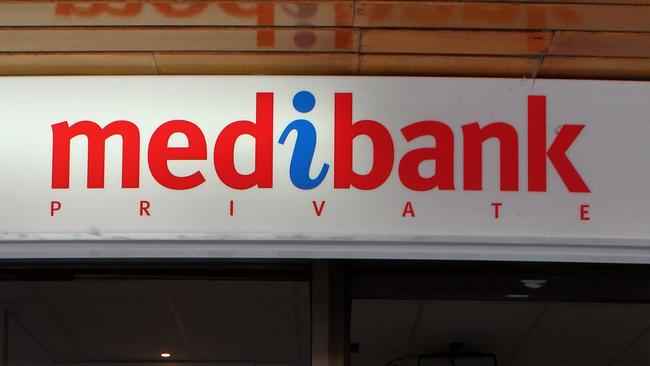
9.37am: What’s impressing analysts
Adbri raised to Hold: Morningstar
Ansel cut to Sell: Morningstar
A2 Milk raised to Hold: Bell Potter
A2 Milk raised to Equalweight: Morgan Stanley
Cashrewards rated New Buy: Ord Minnett
Control Bionics started at Speculative Buy: Morgans Financial
Danakali cut to Hold: Bell Potter
IGO raised to Buy: Shaw & Partners
Insurance Australia raised to Buy: Morningstar
Lindsay Australia rated New Buy: Ord Minnett
QBE Insurance cut to Hold: Bell Potter
QBE Insurance raised to Buy: Morningstar
Western Areas raised to Buy: Shaw & Partners
Eli Greenblat 8.35am: City Chic buys UK brand Evans
Plus-sized women’s fashion chain City Chic Collective has acquired leading clothing brand Evans from Phillip Green’s collapsed Arcadia Group in Britain for $41m, giving it a foothold in Europe to match its recent expansion in the US and growing brand power in Australia.
Evans is part of the collapsed Arcadia group, which also owned well-known fashion brands such as Topshop and which failed last month, putting more than 13,000 jobs at risk in Britain.
Evans is a plus-sized women’s fashion chain with a 90 year higtsory as a high street retailer in Britain.
The deal includes Evans’ ecommerce and wholesale businesses, which generated $46m of sales last financial year, but excludes its “bricks and mortar” store network in Britain.
City Chic says the purchase will be funded from its existing cash balance.
It says Evans, with 19m annual website visits. will give it a platform to launch into a new market with an estimated worth of 9bn annually.
The Arcadia group went into administration on November 30.
City Chic chief executive Phil Ryan said: “Evans gives us an excellent foundation in a new geography to grow our collective and is a brand which aligns with our existing product streams. The acquisition meets our strategic objective of growing through global customer acquisition, digitally, and in the $50 billion curvy apparel market.”
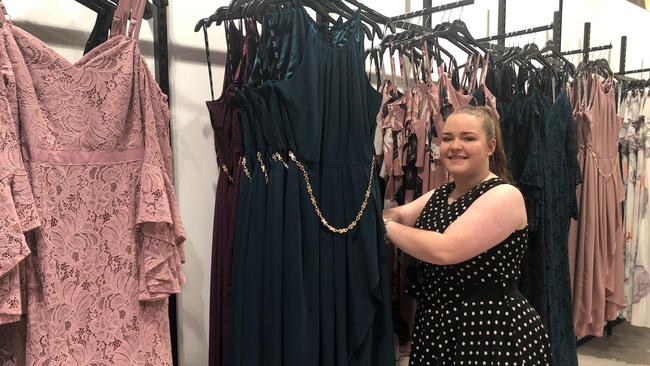
8.19am: Suncorp claims court backing in pandemic case
Insurer Suncorp says it believes its overall reserving for payouts continues to be adequate following a Federal Court ruling which gave a specific win for a claimant under business interruption insurance.
Still, Suncorp said the court’s interpretation is consistent with Suncorp’s position that cover for loss arising from a pandemic is a high risk for an insurer which would normally be excluded.
“While the Federal Court rejected one interpretation of the exclusion clause put, and therefore answered the discrete question put to it as ‘no’, the court also rejected the (claimant’s) narrow interpretation, and accepted Suncorp’s argument that the exclusion applied broadly for losses connected with COVID-19,” Suncorp said in a statement.
“In light of this favorable outcome, Suncorp believes that its overall reserving continues to be adequate.
“It is important to note that valuations do not take account of the potential for further COVID-19 lockdowns, as well as any unexpected outcomes from future litigation including any industry test cases”.
The decision follows the insurance industry mounting a High Court challenge to the judgment on the question of contractual interpretation, arguing the court should find insurers made a mistake in the fine print of their disclosure documents.
Suncorp Group CEO Steve Johnston said: “We recognise these are challenging times for small business and we have put in place a range of measures to support them through this period. Unfortunately, pandemics are an uninsurable risk and premiums have not been paid to cover an event of the scale of COVID-19.”
Suncorp shares last traded at $9.74.
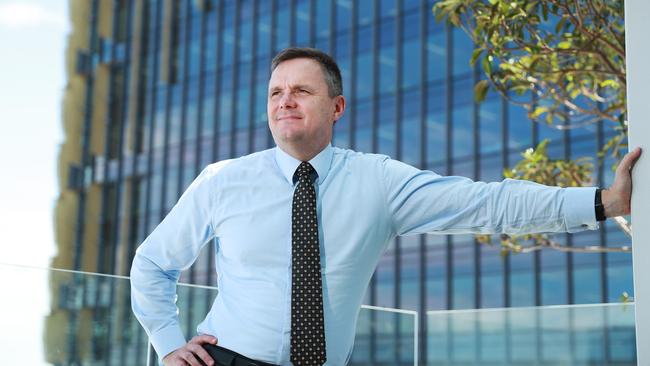
6.45am: Synlait flags 50pc profit fall
Synlait Milk Ltd. cut its fiscal 2021 earnings outlook following last week’s profit warning by key customer a2 Milk, projecting total consumer-packaged infant formula volumes to be down around 35 per cent on year.
Synlait said it now expects net profit in the 12 months through July to be around 50 per cent lower than what it achieved in the 2020 fiscal year.
“This updated guidance announcement reflects the impact that Covid-19 has had on Synlait’s strategic customer,” Synlait said in a regulatory filing. “It also remains subject to the ongoing effects of Covid-19, with consumer behavior, channel dynamics and supply chain disruptions all subject to change.”
On Friday, a2 Milk said a more severe-than-anticipated decline in surrogate-shopping sales to Chinese consumers is weighing on its earnings performance. The company said it expects an operating profit margin of 26 per cent to 29 per cent for its 2021 financial year, down from its previous forecast of 31%.
Pandemic-related disruption in Australia to daigou--surrogate shopping--sales “has proved to be more significant and protracted than was previously anticipated,” a2 Milk said at the time, contributing to a steep fall in its shares.
On Monday, Synlait said it expects to update its fiscal 2021 net profit outlook again when reporting its first-half result on March 29 or as material information becomes available.
“Synlait’s board and management continue to actively pursue opportunities to mitigate the impact of this development that include focusing on the execution of its diversification strategy, asset optimization and prudently managing costs,” the company added.
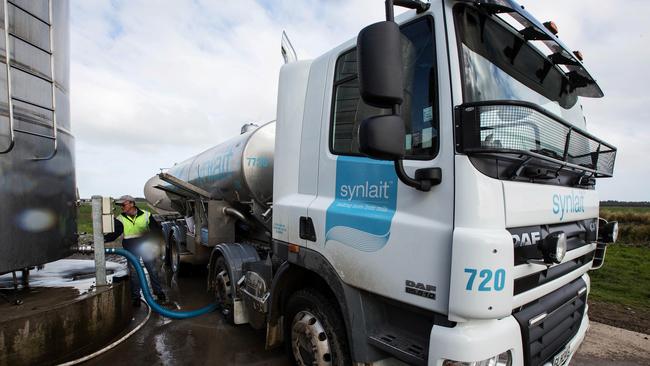
Dow Jones Newswires
6.30am: Markets brace for virus fallout
Local markets are on tenterhooks as the coronavirus outbreak in Sydney’s northern beaches reaches a critical stage, with Victoria and South Australia closing their borders to greater Sydney.
The futures market pointed to a 0.2 per cent fall in local equities at the open on Monday, although analysts said the reimposition of border restrictions would weigh heavily on hospitality and tourism-related stocks. “The economic impact is what matters,” AMP head of investment strategy and economics Shane Oliver said.
“If things are under control by Wednesday we’ll barely notice the impact, but the impact will be much greater if there are further lockdowns.”
While the emergence of the Sydney cluster weighed on Australian shares on Friday, the local market still rose 0.5 per cent for a seventh consecutive weekly gain.
There was a positive global lead, local economic data was stronger than expected, and oil, metal and iron ore prices rose.
The consensus, however, was that share prices are stretched after a strong run since early November, with COVID-19 and associated risks the main near-term threat.
On Wall Street on Friday, all three major benchmarks closed marginally lower, in a disappointing end to a week of fresh record highs.
The Dow Jones Industrial Average was down 0.4 per cent, the S&P500 gave up a similar amount, and the Nasdaq eased 0.1 per cent.
Local stocks finished 81.2 points, or 1.2 per cent, lower at 6675.5.
Despite this, the market still finished 0.5 per cent higher for the week for its seventh straight weekly gain.
6.12am: Jack Ma offer to placate Chinese regulators
As Jack Ma was trying to salvage his relationship with Beijing in early November, the beleaguered Chinese billionaire offered to hand over parts of his financial-technology giant, Ant Group, to the Chinese government, according to people with knowledge of the matter.
“You can take any of the platforms Ant has, as long as the country needs it,” Mr. Ma, China’s richest man, proposed at an unusual sit-down with regulators.
The offer, not previously reported, appeared a mea culpa of sorts from Mr. Ma as he found himself face-to-face with officials from China’s central bank and agencies overseeing securities, banking and insurance. They had called the November 2 meeting after Mr. Ma had lashed out at President Xi Jinping’s signature campaign to control financial risks, which angered the top leadership.
The detail highlights how one of China’s most famous entrepreneurs tried to dig out of his predicament as he and some of his peers attempt to navigate a policy landscape where priorities have shifted toward greater state control over companies deemed to have grown too big and powerful.
“Ant Group cannot confirm the details of the meeting with regulators held on Nov. 2, 2020, because it is confidential,” a spokesman at the company said.
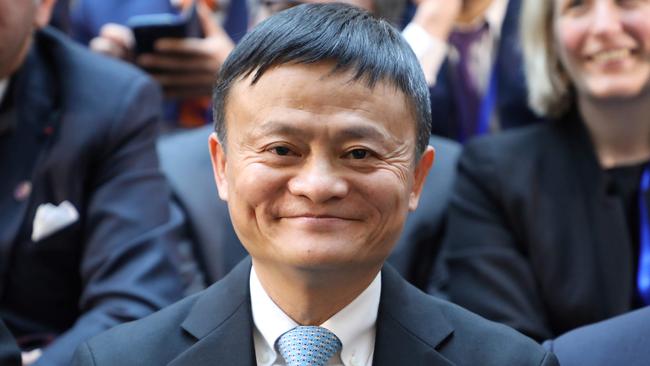
Dow Jones
6.09am: Congress races to approve virus-relief package
A breakthrough on the Federal Reserve’s emergency lending powers cleared a path for Congress to approve a roughly $US900 billion coronavirus aid package, leaving lawmakers hours to finalise the agreement and vote on it.
With the Fed matter settled, negotiators overnight (AEDT) racing to put the finishing touches on the rest of the bill so the House and Senate could hold votes as early as tonight (AEDT) on the package.
The emerging agreement is expected to provide $US300 a week in enhanced federal unemployment benefits, a $US600 direct check to many Americans, as well as aid for schools, vaccine distribution and small businesses.
“This gets done today. No more delays. We are not leaving until we have relief for the American people. People are hurting. People need help,” Senator John Barrasso, the No. 3 Republican in the Senate, said on Fox News Sunday.
Party leaders are pairing the relief measures with a roughly $US1.4 trillion annual spending package, squeezing lawmakers to quickly write and approve the bill before government funding expires at 12:01am on Monday (US time). Congress approved a 48-hour extension of government funding on Friday to give negotiators more time to finish the coronavirus relief package.
Senate Minority Leader Chuck Schumer said that both the House and Senate would be able to pass the legislation on Monday(AEDT). Rushing major bills through the Senate requires consent from rank-and-file members, and Senate Majority Whip John Thune has said the process could last into Tuesday (AEDT).
Dow Jones
6.04am: Fisheries dispute threatens post-Brexit trade deal
Negotiations for a post-Brexit trade deal teetered on the brink of failure Sunday, overshadowed by the coronavirus crisis and deadlocked over the issue of fishing rights.
As Belgium and some of its neighbours closed rail and air links to Britain, which warned it has discovered a new strain of the virus, talks dragged on in Brussels.
After EU negotiator and Michel Barnier and his UK counterpart David Frost met at EU headquarters, the former French Minister tweeted: “In this crucial moment for the negotiations, we continue to work hard.
“The EU remains committed to a fair, reciprocal and balanced agreement. We respect the sovereignty of the UK. And we expect the same,” he said.
And he stressed that, while both sides would control their own laws and waters, “we should both be able to act when our interests are at stake” -- a reference to a mechanism that must be agreed to ensure future fair competition.
Time is running out for a trade deal, with Britain due to leave the EU single market in 11 days, but both sides of the intense negotiations in Brussels now expect the talks to run until tonight (AEDT) and perhaps on to Christmas.
Without a deal, Britain’s participation in the European project ends at midnight on December 31 with a new tariff barrier to sharpen the shock of unravelling a half-century of partnership.
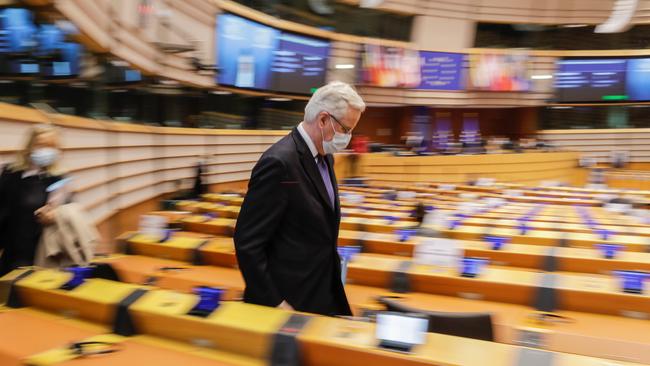
6.00am: Wall Street recap
Wall Street stocks declined Friday, retreating from records, as markets awaited resolution of long-running congressional talks on another relief package for the coronavirus-ravaged US economy.
Congressional leaders have described the negotiations as in the home stretch, but there was still no deal Friday afternoon ahead of a midnight deadline to avert a government shutdown.
The Dow Jones Industrial Average dropped 0.4 per cent to 30,179.05. The broadbased S&P 500 also fell 0.4 per cent to 3,709.41, while the tech-rich Nasdaq Composite Index slipped 0.1 per cent to 12,755.64.
All three indices had closed at records on Thursday, in part on optimism about a stimulus package.
Republicans and Democrats braced for possibly working through the weekend to conclude a $900 billion deal aimed at providing emergency relief for millions of struggling families and businesses amid signs of a worsening economy and as the country sees record high death tolls from the coronavirus pandemic.
“While there’s a lot of optimism about stimulus, it’s important not to count on it,” said TD Ameritrade’s JJ Kinahan in a note Friday morning.
“It’s easy to see things going south and the market taking it pretty hard, with so much stimulus premium already built in. Hope for the best, but prepare for the worst, as the saying goes.” FedEx fell 5.7 per cent after reporting that quarterly profits more than doubled to $1.2 billion behind booming e-commerce volumes. However, the delivery company declined to provide a forecast, citing uncertainty amid the coronavirus pandemic.
Tesla gained 1.1 per cent ahead of its inclusion in the prestigious S&P 500 index, which will mean it is added to myriad trading vehicles.
AFP




To join the conversation, please log in. Don't have an account? Register
Join the conversation, you are commenting as Logout